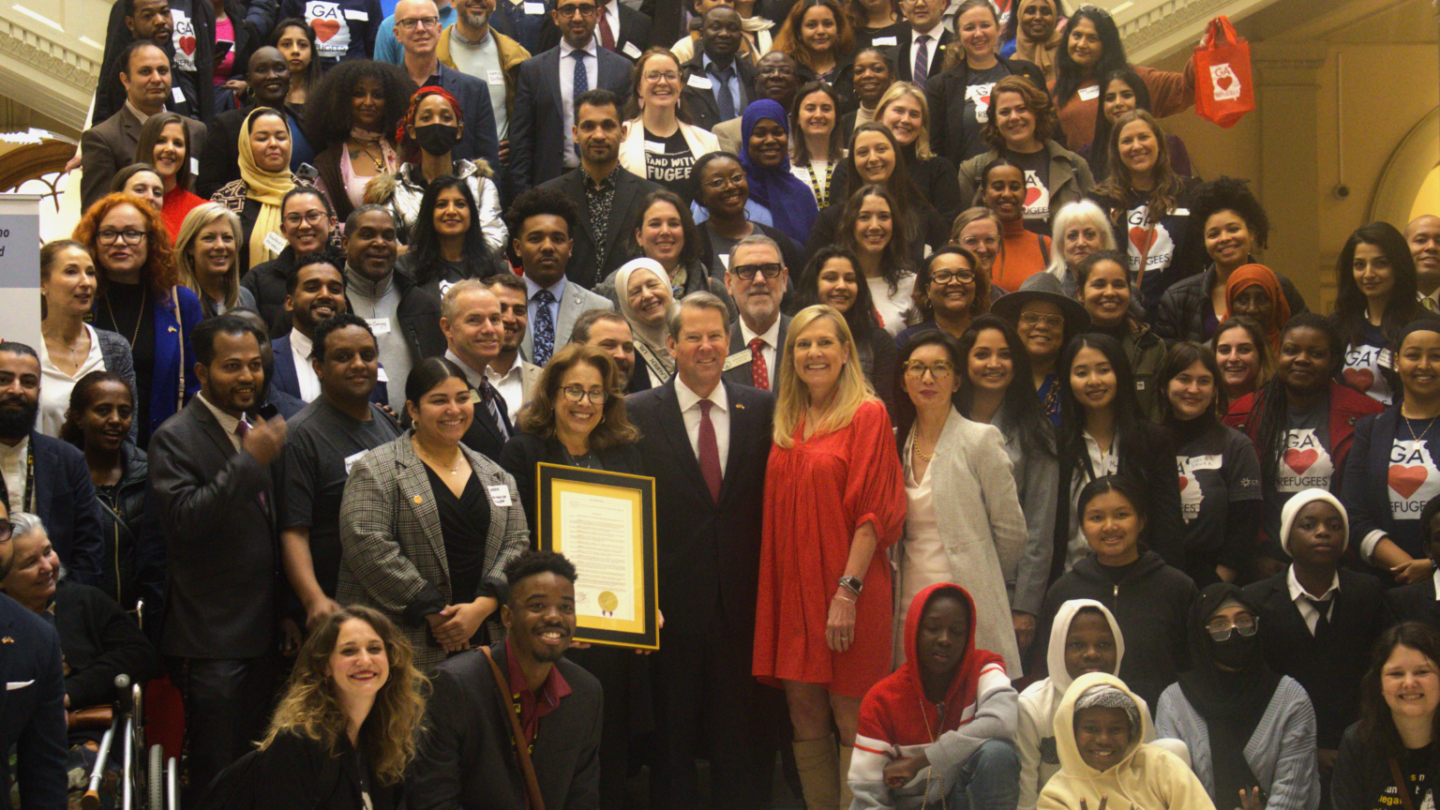The 10th annual New Americans Celebration drew about 300 case workers, advocates and allies to the state Capitol this month to welcome resettled refugees and immigrants to Georgia.
The Coalition of Refugee Service Agencies (CRSA) organized the event to honor the more than 1 million foreign-born residents who call the Peach State home. And as a nod to the economic contributions of new Georgians, the motto plastered on red tote bags, t-shirts and chanted throughout the Capitol in solidarity that day was “Georgia Loves Refugees.”
The celebration kicked off at downtown Atlanta’s Catholic Shrine of the Immaculate Conception with prayers from faith leaders, along with a few remarks from lawmakers and community members.
Participants also received a crash course preparing them to lobby for policy reforms such as HB 131 that aims to make tuition more accessible to Deferred Action for Childhood Arrival recipients, and another reform granting refugees and humanitarian parolees in-state tuition.
The agenda included ways to alleviate barriers blocking foreign-trained mental health clinicians from resuming practice in Georgia, which would be vital in providing culturally competent mental health care to people coping with trauma after having their lives uprooted.
Alondra Guerrero is a social worker for Catholic Charities Atlanta who works primarily with unaccompanied minors from Latin America, many of whom have escaped gang related violence and civil wars.
Guerrero understands firsthand the importance of providing these children with psychological counselors who understand their cultural background and can speak their language.
“It is so difficult finding adequate mental health resources, counseling, therapists and support groups especially in Georgia. And when we do find a therapist or clinician, they’re usually at capacity. And so I feel like the kids don’t connect as well to their therapists,” Guerrero said.
State Sen. Jason Estevez, an Atlanta Democrat, offered a few words of support before the crowd assembled at Immaculate Conception set out to speak with legislators across the street at the Capitol. He said as a Puerto Rican-born citizen he sympathizes with the journey immigrants must push through to gain asylum in America.
“If you’re not at the table of power in this country, then you’re on the menu. And for many of our communities, we’ve been on the menu for way too long,” Estevez said, “It is time for us to be at the seats of power, making our voices heard, making sure that we have representation in the rooms where decisions are made.”
“That’s why it’s important for you to be here and to tell these legislators exactly what’s important to you and how you feel,” Estevez said.
The Peach State boasts some of the most effective resettlement programs in the country now going on forty years strong. Georgia is well-established as a safe haven for people seeking a life free of violent wars and government persecution.
For the past three years, Georgia’s immigrant population has grown by 20,000. The CRSA reports that out of this pool, 1,697 Afghan Allies resettled in counties across Georgia.
The most recent mass exodus is a result of the evacuation of U.S. forces from Afghanistan in August of 2021 after a 20-year war that followed the 9/11 attacks. The decision to evacuate left thousands of Afghan families vulnerable to retaliation once the Taliban seized control of Kabul.
The Biden Administration launched Operation Allies Welcome, which brought in more than 155,000 resettlers to the states. This was a steep jump in the number of immigrants and refugees allowed into the country in the wake of the Trump Administration’s restrictive border policies. President Donald Trump instituted a ban on immigrants from Muslim countries, barring entry to asylum-seekers from countries such as Afghanistan.
Soon after President Joe Biden took office in 2021, he issued orders to evacuate the remaining U.S. troops from Afghanistan. A refugee resettlement program had to be rebuilt from the ground up. And the sudden influx of Afghan evacuees overwhelmed an already strained resettlement program.
New American Pathways is an Atlanta based nonprofit that resettles refugees and helps them build new lives. New American Pathways has resettled 351 Afghan evacuees.
It has been almost two years since the chaotic withdrawal of U.S. troops from Afghanistan. Many evacuees from Afghanistan have reached safety here in the U.S., but they still face many obstacles rebuilding a life that resembles the ones they were forced to leave behind, said New American Pathways Chief Advancement Officer Nancy Gaddy.
“There are people that went through phenomenal trauma. And, they’re still working through that. We have sort of an ongoing case management team that provides a lot of other services like medical services and support that maybe they wouldn’t have gotten,” Gaddy said.
Support for refugee families and humanitarian parolees comes from people all over the state, her agency refers to these supporters as “family friends,” Gaddy said. And their case workers provide services for single parents and assist with specialized health care needs, including elder care and mental health care.
“We’ve had groups make welcome baskets when folks first arrived, and they were living in an Airbnb or a temporary apartment, providing everything from Farsi and Dari English language dictionaries, laminated maps, MARTA maps; culturally appropriate foods like teas, rice, cakes, and then taking those extra steps to help people,” Gaddy said.
Since the Afghans first arrived in Georgia, the nonprofit has helped about 95% of refugees and parolees from the country achieve self-sufficiency. Many of the heads of the households earn at least $16 per hour.
The agency is also kick-starting a program called the Individual Development Account, which will provide financial literacy education and budget management to Afghan refugees. The program is funded by the federal Office of Refugee Resettlement, and the aim is to help newcomers build wealth with a savings match program.
“We were one of just four or five agencies in the United States to receive a significant amount of funding from the Office of Refugee Resettlement, to help Afghans here in Georgia, whether they were our clients, or whether they were people resettled by the other agencies, basically build wealth,” Gaddy said.
Another resettlement agency in Georgia that has successfully helped many Afghan families is Inspiritus, which is a faith-based organization aiming to provide shelter and resources for anybody in need.
Inspiritus has resettled more than 550 Afghan parolees in metro Atlanta since August, 2021. The nonprofit reports that 100% of Afghans that they work with are in permanent housing and more than 90% of households were financially self-sufficient within eight months of entering the U.S.
While many of the refugees and parolees who have resettled in Georgia are doing well, advocates say there is still work that remains to be done.
The Executive Director of Refugee and Immigrant Services for Inspiritus, Aimee Zangandou – who along with her family escaped the Rwandan genocide in 1994 and weren’t resettled in Georgia until 1997 – relates to the plight of the Afghan evacuees and believes more can be done on a federal level.
“I think the fact that they don’t have a pathway to permanent residency, they just have temporary status to be in the U’S’, that has taken a toll on them. Because they’re not sure they’re going to stay in this country, I mean, that will keep you awake,” Zangandou said.
“We definitely could see good intentions with the policies that are being passed, you know, welcoming the Afghan allies. It’s absolutely a great idea. And I’m glad that we do,” Zangandou said, “But having brought them here with no permanent status, it’s a failure. And having not passed, the Afghan Adjustment Act, that would give them a pathway to permanent residency is concerning.
The two-year mark since the evacuees started to arrive in the U.S. is coming up, and February marked the one-year anniversary of Russia’s war on Ukraine.
Many who escaped Afghanistan qualify as Humanitarian parolees, but people seeking asylum from the war in Ukraine face a steeper challenge to gain permanent status and necessities like housing, medical and financial assistance.
Through the Uniting for Ukraine program, Ukrainians displaced by the war can apply to become humanitarian parolees, but they aren’t offered the same resettlement benefits that helped Afghan evacuees gain permanent residency or reunite with family members who remain abroad, Gaddy said.
But along with the Uniting for Ukraine program, New American Pathways is also working to provide eligible Ukrainians with case management services.
“Georgia has a history of faith traditions, humanitarian traditions, and Georgians want to welcome the stranger. Welcome those in need. That is part of who we are as Georgians,” said Darlene Lynch, Co-Chair of the CRSA. “We need this talent to keep Georgia growing and keep Georgians prosperous.”









